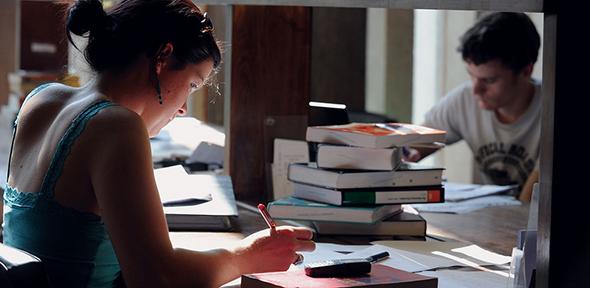
Developments in teaching and learning were to the fore at last week’s open meeting for University administrative staff.
New and innovative plans to enhance Cambridge’s already outstanding teaching and learning were laid out at last week’s open meeting for administrative staff.
Speaking just before Friday’s historic referendum result, Pro-Vice-Chancellor for Education Professor Graham Virgo said that the collegiate University was rightly renowned for its educational excellence – but that a range of challenges meant that a renewed focus was required.
It is clear that important questions remain as to what the impact of last week’s referendum vote will have on higher education tuition fees, loans and bursaries. However, the University can confirm that:
- Undergraduate EU students who are already studying at Cambridge, who have an offer to study at Cambridge, or who apply in 2016 to start their studies in 2017, will continue to be charged the UK fee rate applicable at the time, provided this continues to be permitted by UK law. The UK fee rate may be subject to increases, which may be annual. The fees for all applicants, including Home/EU students, considering entry in 2018 (including deferred entry from 2017), have yet to be set
- Graduate Home/EU students who are already studying at Cambridge, and those who have applied or are applying to start their studies in the academic year 2016/17, will continue to be charged the Home/EU fee rate applicable at the time of their application, provided this continues to be permitted by UK law.
Speaking to more than 200 staff at the meeting, Professor Virgo began by summarising his PVC portfolio, which covers undergraduate and graduate students, part-time students, libraries and library services, sport, and the University of Cambridge Primary School. He explained that much of his focus since taking over as PVC 18 months ago had been on the Teaching Excellence Framework, with the University having agreed to implement TEF1 from October 2017. This would see HE providers meet basic quality assurance standards in return for being able to raise fees by 2.8 per cent. As of last week, implementation of TEF2 was subject to a technical consultation, although the future of the Higher Education and Research Bill is now unclear following last week’s events.
Promoting innovation
Turning to developments within Cambridge, Professor Virgo reported on the work of the recently launched Centre for Teaching and Learning, which aims to promote, capture and share outstanding teaching and pedagogical innovation across the collegiate University. The Centre is doing this in a number of ways. A new annual Teaching Forum took place in April this year and was attended by 130 people from across faculties, departments, Colleges and other institutions. There are also plans to run a series of workshops looking at important issues such as digital education and examinations. And considerable thought is going into how outstanding teaching should be appropriately recognised.
Digital education will become increasingly important and a new strategy is being developed to ensure that Cambridge seizes opportunities in this area. This strategy will be pedagogically focused, will support both the educational and student experience, and stimulate innovation. There are three principal strands of activity underway: a pilot looking at lecture capture; another pilot examining the potential of computer-based exams; and the Teaching and Learning Innovation Fund.
Other key developments in relation to teaching and learning include: the decision to discontinue the public display of class lists; student and teacher workload; a review of the examination process; how the University handles and responds to various student disciplinary matters; and consideration of how best to use the University’s estate for teaching and learning.
Professor Virgo also spoke of the importance of supporting the University’s ambition to grow graduate student numbers by two per cent a year, and a new recruitment strategy was being implemented with this in mind. The University and Colleges fundraising campaign will also play an important role in helping to realise plans for postgraduate education at Cambridge.
Earlier at the meeting, the Registrary, Dr Jonathan Nicholls, spoke about the Higher Education and Research Bill, the plans for implementation of which now look uncertain. He also mentioned some of the recent developments within the University and UAS, which can be read in detail in the UAS’s latest annual report. He mentioned too that the search for the new Vice-Chancellor was well advanced, with an announcement expected to be made some time in the Michaelmas Term. The search for a new Registrary had also begun, with that process being overseen by the Academic Secretary. The University Council had also agreed to strengthen the University’s senior leadership team by appointing a Chief Finance Officer. Talent at all levels of the University would be vital in meeting the considerable challenges ahead for Cambridge and the higher education sector, he added.
